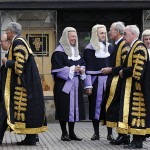Share it
 The Easter Term starts today and runs until Friday 24 May 2013. It’s one of the shorter terms, but the Justices (including new appointees Lord Justice Hughes and Lord Justice Toulson) will be busy with a heavy caseload on subjects ranging from Kazakhstani hydroelectric power plants to airline seats. Here are a few of the matters listed over the next seven weeks:
The Easter Term starts today and runs until Friday 24 May 2013. It’s one of the shorter terms, but the Justices (including new appointees Lord Justice Hughes and Lord Justice Toulson) will be busy with a heavy caseload on subjects ranging from Kazakhstani hydroelectric power plants to airline seats. Here are a few of the matters listed over the next seven weeks:
Booth v The Parole Board; Osborn v The Parole Board; In the matter of an application of Reilly for Judicial Review (Northern Ireland) (16 – 19 April 2013): In Booth the appellant seeks judicial review of the Parole Board’s decision to refuse oral hearings relating to an indeterminate sentence, and Osborn’s case relates to a refusal to hold an oral hearing following recall after release on licence under a determinate sentence. In Reilly the appellant was given an automatic life sentence, and at the end of his tariff a Parole Board member considered his case on the papers and refused to release him or hold an oral hearing. The Court of Appeal held that the appellant had no absolute right to an oral appeal, and in any case was not entitled to one on the facts. These linked matters will clarify the circumstances in which an offender is entitled to an oral hearing at a Parole Board.
Vestergaard Frandsen A/S & Ors v Bestnet Europe Ltd & Ors (24 – 25 April 2013): The respondents are ex-employees of the appellant company, which develops and sells insecticidal mosquito nets. The respondents developed an anti-mosquito net which the appellants claim was based on confidential information from their former employer’s database. As it could not be shown that the respondents knew that the information used to develop the competing product was from the database, it is for the Supreme Court to determine whether or not a party who is the subject of a duty of confidence must have actual or objective knowledge that the acts complained of constitute a breach of that duty.
O’Neill No. 2 v Her Majesty’s Advocate; Lauchlan v Her Majesty’s Advocate (29 – 30 April 2013): This case concerns both allegations of judicial bias and the determination of what constitutes “trial within a reasonable time”. Prior to the commencement of the appellants’ murder trial the judge described them as “dangerous and evil sexual predators of the worst kind”, and the Supreme Court will rule on whether his remarks would lead a fair-minded and informed observer to conclude that there was a real possibility of bias on the part of the trial judge. Article 6 has also been raised – the appellants were originally detained and questioned by police in 1998, and the Court will have to determine whether the appellants were “charged” then for the purposes of their right to a trial within a reasonable time under ECHR, art 6.


